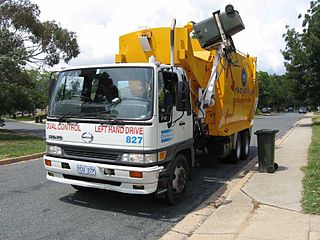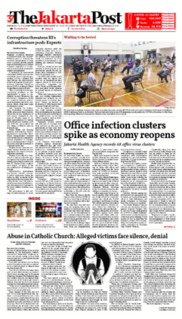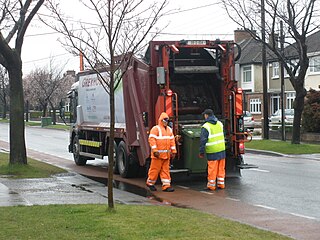Activities
Greenlifestyle facilitates the distribution of green tips, news and events-related information (and encourages information sharing by others) through electronic media and public events, and by engaging the private sector through more focused environmental actions. Between 2007 and early 2009, Greenlifestyle maintained a presence in The Jakarta Post Weekender magazine through a monthly column, ran a bi-weekly radio show on GreenRadio FM, and established a presence in Aksara book stores through strategically placed green tips. [2]
Occasionally, Greenlifestyle volunteers participate in related events in collaboration with other non-profit organisations, e.g. encouraging the public to reduce the use of plastic bottles during outings, [3] or raising awareness on waste issues to schoolchildren. [4]
The community members also get together at occasional events to learn how and where to recycle paper, make compost, design a green house etc. At these events, a pooling center for recyclable plastic, bottle, paper packages and used batteries is often provided. [5]

The ASTM International Resin Identification Coding System, often abbreviated RIC, is a set of symbols appearing on plastic products that identify the plastic resin out of which the product is made. It was developed in 1988 by the Society of the Plastics Industry in the United States, but since 2008 it has been administered by ASTM International, an international standards organization.

Recycling is the process of converting waste materials into new materials and objects. The recovery of energy from waste materials is often included in this concept. The recyclability of a material depends on its ability to reacquire the properties it had in its original state. It is an alternative to "conventional" waste disposal that can save material and help lower greenhouse gas emissions. It can also prevent the waste of potentially useful materials and reduce the consumption of fresh raw materials, reducing energy use, air pollution and water pollution.

Litter consists of waste products that have been discarded incorrectly, without consent, at an unsuitable location. Litter can also be used as a verb; to litter means to drop and leave objects, often man-made, such as aluminum cans, paper cups, food wrappers, cardboard boxes or plastic bottles on the ground, and leave them there indefinitely or for other people to dispose of as opposed to disposing of them correctly.
CERES Community Environment Park is a 4.5-hectare (11-acre) environmental education centre and social enterprise located in urban Brunswick East, Victoria, Australia. CERES stands for Centre for Education and Research in Environmental Strategies. The name also connects with Ceres the goddess of agriculture in Roman mythology.

Kerbside collection or curbside collection is a service provided to households, typically in urban and suburban areas, of collecting and disposing of household waste and recyclables. It is usually accomplished by personnel using specially built vehicles to pick up household waste in containers that are acceptable to, or prescribed by, the municipality and are placed on the kerb.

The Jakarta Post is a daily English-language newspaper in Indonesia. The paper is owned by PT Niskala Media Tenggara and based in the nation's capital, Jakarta.

TerraCycle is a private U.S.-based recycling business headquartered in Trenton, New Jersey. It primarily runs a volunteer-based recycling platform to collect non-recyclable pre-consumer and post-consumer waste on behalf of corporate donors or municipalities to turn it into raw material to be used in new products. The company licenses its name to manufacturers of roughly 200 products made using its raw material. TerraCycle also manages Loop, a consumer-products shopping service with reusable packaging.

Sustainable Development Strategy for organizations in Canada is about the Government of Canada finding ways to develop social, financial, and environmental resources that meet the needs of the present without compromising the ability of future generations to meet their own needs in Canada. A Sustainable Development Strategy for the organization needs to be developed that establishes the Sustainable Development goals and objectives set by the Auditor General Act of Canada and provides the written policies and procedures to achieve them. Sustainable Development is based on responsible decision-making, which considers not only the economic benefits of development, but also the short-term and long-term, Canadian environment and environmental impacts.

This article outlines the position and trends of recycling in Canada. Since the 1980s, most mid to large municipalities in most provinces have recycling programs, relying on curbside collection with either bins, boxes, or bags. These systems are not standardized, and the specific process differs for each province. Certain provinces have container-deposit systems in place for bottles, cans, and other beverage containers.
There is no national law in the United States that mandates recycling. State and local governments often introduce their own recycling requirements. In 2014, the recycling/composting rate for municipal solid waste in the US was 34.6%. A number of U.S. states, including California, Connecticut, Delaware, Hawaii, Iowa, Maine, Massachusetts, Michigan, New York, Oregon, and Vermont have passed laws that establish deposits or refund values on beverage containers while other jurisdictions rely on recycling goals or landfill bans of recyclable materials.

Rates of household recycling in Ireland have increased dramatically since the late 1990s. The Irish Environmental Protection Agency (EPA) is the agency with overall responsibility for environmental protection in the Republic of Ireland and monitors rates of recycling in Ireland along with other measures of environmental conditions in Ireland. The EPA, along with Repak, the principal organisation for packaging recycling in Ireland, report on recycling rates each year. In 2012 Ireland’s MSW recycling rate was 34%, while the rate of packaging recycling reached 79%. The amount of municipal waste generated per person per year in the Republic of Ireland has fallen significantly in recent years. This figure remains above the European Union annual municipal waste average of 503 kg per person, however. Each local council in Ireland has considerable control over recycling, so recycling practices vary to some extent across the country. Most waste that is not recycled is disposed of in landfill sites.
Recycling in the Netherlands is under the responsibility of local authorities. Different localities implement different systems. Municipalities all over the country publish a calendar, on a yearly basis, of the pickup dates and the addresses of the waste separation and recycling stations.

In 2015, 43.5% of the United Kingdom's municipal waste was recycled, composted or broken down by anaerobic digestion. The majority of recycling undertaken in the United Kingdom is done by statutory authorities, although commercial and industrial waste is chiefly processed by private companies. Local Authorities are responsible for the collection of municipal waste and operate contracts which are usually kerbside collection schemes. The Household Waste Recycling Act 2003 required local authorities in England to provide every household with a separate collection of at least two types of recyclable materials by 2010. Recycling policy is devolved to the administrations of Scotland, Northern Ireland and Wales who set their own targets, but all statistics are reported to Eurostat.
Green Action Centre is an environmental non profit organization based in Winnipeg, Manitoba. It works to promote greener living through environmental education for households, workplaces, schools, and communities. It also develops and advocates environmental policies for the Manitoba communities. Its primary areas of activity include green commuting, composting and waste, sustainable living and resource conservation.
The digital commons are a form of commons involving the distribution and communal ownership of informational resources and technology. Resources are typically designed to be used by the community by which they are created.

KBR is the first independent national radio news agency of Indonesia. It is a unique initiative to assist Indonesia's transition to democracy by facilitating open and informed discussion among millions of people throughout the archipelago. Simply by tuning into their favourite local radio station, millions of Indonesians from across the political, economic and social spectrum can engage in radio debates and, in doing so, influence key issues affecting their lives.
GreenBottle Ltd was the manufacturer of sustainable, paper-based liquids packaging. In 2017, Ecologic Brands Inc.,based in Manteca California, purchased the assets of the former GreenBottle.

Greenkeepers is an international, non-profit, and non-governmental service organization founded in 2009. Founded in Beijing, China, Greenkeepers is devoted to inspiring environmental awareness through local impacts within communities across the globe, including but not limited to its offices in Beijing and Fremont. Greenkeepers aspires to fundamentally change the way people see environmental work, and is renowned within local communities for its approach of leading by example - not only transforming the environment or promoting environmental awareness, but also redesigning societies' consumptions of limited resources.

Alya Nurshabrina Samadikun is an Indonesian International Relations Ambassador, fashion model, painter, and beauty queen. She represented province of West Java at the Miss Indonesia 2018 pageant, where she won the title and crowned by the Miss Indonesia 2017 titleholder, Achintya Holte Nilsen from West Nusa Tenggara, in the finale held on 22 February 2018. She earned the right to represent Indonesia at the Miss World 2018 pageant in China.
Swietenia Puspa Lestari is an Indonesian underwater diver, environmental engineer and environmental activist.












